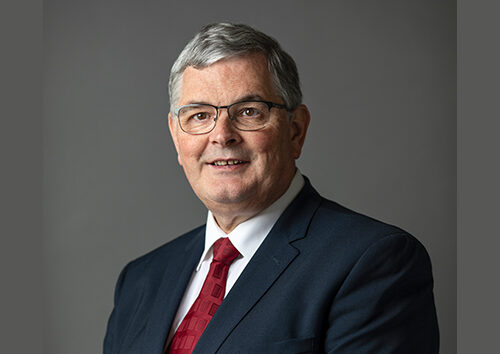Presented by Wintley Phipps
24 August 2012, Rogaška Slatina, Slovenia [John Surridge, tedNEWS] The voice of renowned singer, Wintley Phipps, who also serves as the pastor and director of “Dream Academy”, was first heard by the pastors at the EPC when he performed the song “His Eye is On the Sparrow” on Thursday. In Friday’s first plenary session however, he spoke.
Not that he didn’t sing as well – that would have been to cheat the 1,000 plus assembly out of an experience they had all been eagerly anticipating. His performance of “Amazing Grace” did not disappoint. The change in key that lead into that line “When we’ve been there 10,000 years” was literally spine tingling.
Elder Phipps first came to Europe in 1975, though he noted that much had changed since then. In October 1992 he had the privilege of singing at the Olympic Stadium in Moscow – backed by a choir of 5,000! He has other connections with Europe: his backing music was recorded in Prague and last year he sang in the largest prison in Slovenia. This experience was related with some emotion – it was the first time, said Elder Phipps, that spouses and children had been allowed to join the inmates for such an event. Caring for the less privileged is a burden that God has placed on Elder Phipps’ heart. Fifteen years ago he founded a ministry to children of prisoners in America. He calls this his “Cup of Water” ministry because “it has no strings attached.”
Moving on to his main message Elder Phipps fired a warning shot: “I can speak openly and honestly because I know that my ticket home is secure.” He also cautioned that there was a possibility that he might end up preaching as he does in his home church. Nervous technicians and podcast editors were, however, quickly placated by his subsequent qualification: “… but for a message to be immortal, it does not have to be eternal.”
![[Photo: Thomas Muller, Presidnet of the Church in Denmark]](../sites/default/files/EPC-Plenary-T.Muller-m.jpg) Elder Phipps began by recognizing the challenge that we face. “To make God known in Europe,” he said, “we are called to make God known to minds that are steeped in Western culture.”
Elder Phipps began by recognizing the challenge that we face. “To make God known in Europe,” he said, “we are called to make God known to minds that are steeped in Western culture.”
Our situation, though, is not that different from the situation that Paul found himself in, in the Greco-Roman culture of the first century, and Phipps then told his story. Paul, a Jew, but schooled in Grecian thought; a Roman citizen by rights and privileged; truly multi-cultural and cosmopolitan; was recruited as a bounty-hunter for the Pharisees. The story starts with him tracking a band of Christians, but, said Elder Phipps, “the hunter was being hunted. He was being hunted by none other than Jesus Himself.”
In Elder Phipps’ view the dramatic transition in Paul’s life came, not so much through the experience on the Damascus road when Jesus said, “Saul, why are you persecuting me,” but through his subsequent quiet time in Arabia.
Yes, Paul was shunned and persecuted once he turned his back on his former way of life, but Jesus used the persecution to refine Paul’s character. “Jesus feels the pain we suffer when we are persecuted,” said Elder Phipps, quoting Ellen White’s comment that “the blow that is aimed at us, first falls on Christ.”
It was through the experience of persecution, and through the subsequent quiet time in Arabia, that Paul saw the mistakes of his own life and was able to deal with them. “In the same way,” said Elder Phipps, “God places our flaws before us so that we can pray over them.” In fact, he went on, “Often the best gifts that we have are given in compensation for what we have been through.”
 Lest anyone think that he was being self-righteous, Elder Phipps used an illustration from his own life to demonstrate this principle. He told of how many years ago, when he was first married, his wife noticed – and gently related to him – that he was treating her pretty girlfriends better than the ones who weren’t so pretty. “You need to treat them all the same,” she said. It was a lesson he learned then and there, and a principle he has carried with him through life.
Lest anyone think that he was being self-righteous, Elder Phipps used an illustration from his own life to demonstrate this principle. He told of how many years ago, when he was first married, his wife noticed – and gently related to him – that he was treating her pretty girlfriends better than the ones who weren’t so pretty. “You need to treat them all the same,” she said. It was a lesson he learned then and there, and a principle he has carried with him through life.
But the main question, briefly left hanging, was, what happened to Paul in Arabia? Elder Phipps found an answer in Galatians 1:15,16 where Paul says, “God called me by his grace to reveal his Son in me.”
“This is the summation of our calling,” said Elder Phipps. “We are called by God’s grace to reveal His Son in us… This is God’s purpose.”
For the remainder of his time on the platform Elder Phipps hammered home this message. It was a no-compromise, no holds barred appeal to the assembled pastors. “This is the nucleus of Paul’s theology. This is what was taught to Paul by Jesus in Arabia. This is the true purpose of the church.”
Summed up in one word: “Christ-likeness”. This, said Elder Phipps, became the true purpose of Paul and it is the true purpose of the church today.
Pre-empting many unspoken questions Elder Phipps admitted that, regarding his theology Paul had his critics then and he has his critics now. “Some people think that Paul distorts the teachings of Jesus,” he said, “but I think that Paul left us a theological heritage that we have lost sight of: that revealing Christ to the world around us, in us, is the true purpose of the church.”
“Revival and Reformation without Christ-likeness is pointless,” he continued. “Nothing we communicate to the world is more important than Christ-likeness… This should not be seen as an impossible burden, a standard we can never attain… Transformation of character is important, and it is possible.”
![[Photo: Pastor Wintley Phipps]](../sites/default/files/W.Phips-praying-m.jpg) “Growing Christlike people who live so that God can reveal his son in them – this is the true purpose of the church, and every other purpose must serve that purpose,” said Elder Phipps. “Nothing is more important in the Christian life than the pursuit of Christ-likeness.”
“Growing Christlike people who live so that God can reveal his son in them – this is the true purpose of the church, and every other purpose must serve that purpose,” said Elder Phipps. “Nothing is more important in the Christian life than the pursuit of Christ-likeness.”
This was Paul’s epiphany in Arabia but the question is, do we as a people reveal the character of Christ today?
A challenge: “Everything that we have achieved as a church – if it does not equate to Christ-likeness, then we will have very little success in making God known in Europe.”
Repeated with humour, a degree of irony, and to much applause, “We will be like bald men trying to sell hair-growing cream!”
“I believe this ought to be the marketing brand of the Seventh-day Adventist church,” said Elder Phipps, “that we grow people who look more like Jesus so that we can invite the world to embrace our faith… Any other goals, though noble, can become a distraction. I want to move the church to this understanding of its true purpose.”
In his closing prayer Elder Phipps asked God to give the assembled ministers courage to face up the realities in their our own lives, and make the changes necessary to enable them to develop Christ-likeness, both in their own lives and their churches.
During the ensuing break, above the hubbub of thirty or so competing languages, a word could be heard repeated over and over. Christ-likeness. Christ-likeness? Is it really the ONE thing that God wants to see in His church in the twenty-first century? Perhaps it is. [tedNEWS]
tedNEWS Staff: Miroslav Pujic, director; Deana Stojkovic, editor; Dragana Selakovic-Duval; Frederic Duval & Tor Tjeransen, photographers
119 St Peter’s Street, St Albans, Herts, AL1 3EY, England
E-mail: [email protected]
Website: www.ted-adventist.org
tedNEWS is an information bulletin issued by the communication department of the Seventh-day Adventist Church in the Trans-European Division.
You are free to re-print any portion of the bulletin without need for special permission. However, we kindly request that you identify tedNEWS whenever you publish these materials.


